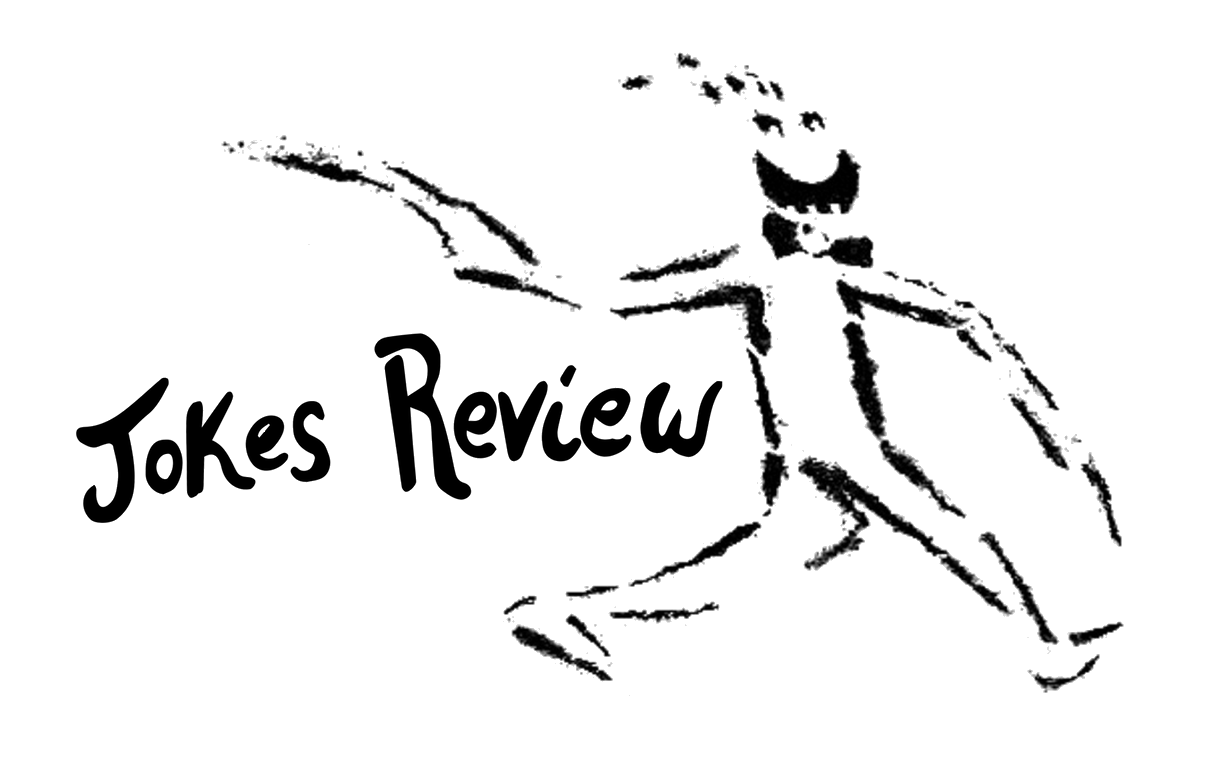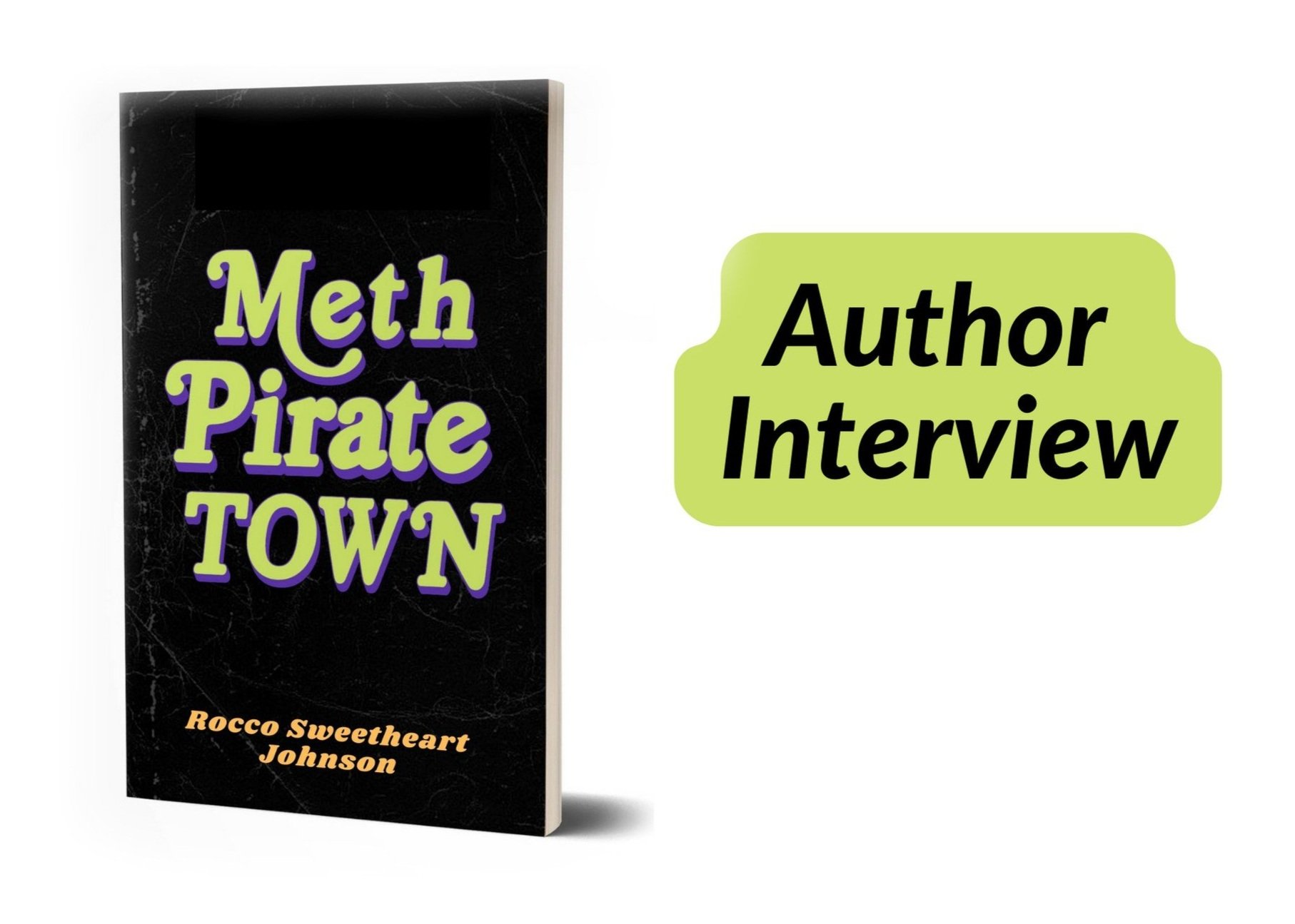by Lane Chasek
Jokes Review’s new book series, Egregious Pulp, is an egregious, pulpy, NC-17 imprint that harkens back to the days when genre fiction and other forms of “low-class” literature weren’t as esteemed as they are today. This was a time when sci-fi and detective novels were printed on cheap pulp-fiber paper (hence the term “pulp fiction”), and whenever readers were done reading said novels, they’d either burn them in order to cook dinner (hence the term “pot boiler”) or wipe their asses with Chapter 7.
Rocco Sweetheart Johnson’s Meth Pirate Town is the first title in this brave new series. Meth Pirate Town follows the debauched story of Frank, a one-eyed, multiply terminally-ill drug-, porn-, and slum-lord, and a cast of students, prostitutes, and cops who intersect with Frank’s attempts to build an empire. It’s a novel about meth labs, porn production, affordable housing, and the intricate financial landscape of the sex-work industry. I got in touch with Johnson via email and wound up with the following interview.
Lane Chasek: Well, let’s start things off personally. How did you get from the womb to where you are right now?
Rocco Johnson: I’ve been stomping around the urban wastelands of greater Los Angeles for most of my life. That’s how it started and probably how it’s gonna end.
The first word I thought of when reading Meth Pirate Town was “Dickensian.” Or maybe Tom Wolfe with more drug use. Who would you say your influences are? Am I close with Wolfe?
Yeah, Wolfe is on point. It’s hard to complain about a book like The Kandy-Kolored Tangerine-Flake Streamline Baby. I like anything with a sense of mania or stylized enthusiasm. Plus an unusual cast of characters.
Here are a few names. Alejandro Jodorowsky, Donald Barthelme, Eve Babitz, François Rabelais, John Waters, Bukowski, Palahniuk, Kōbō Abe, Philip K Dick.
I understand this is your first novel, but I’m always interested in learning about the process behind the novel. Was there a draft before this one? Was this the offshoot of a different project? Or was this more of a rapid-fire first-go-around situation? Really, what’s your process for writing a narrative like this?
I wrote this by hand in a notebook. Using different colored pens. When you flip through it, it’s a crazy, multi-colored mess. I have many notebooks like this. Meth Pirate Town is the first full novel I’ve transcribed from the notebooks, but I’ve probably got a few other novels in there. Definitely a lot of rants, screeds, scribbles, and thoughts.
The protagonist, Frank, uses lube that’s a byproduct of crystal meth production, which is an idea I don’t think Breaking Bad ever touched on. Where did this idea come from?
The book was partly inspired by my time living in an old apartment building where my neighbors on the other side of my bedroom wall, I’m pretty sure, had a meth lab. And I had some reasons to believe my landlord was in on it. So my roommates and I talked about meth a lot. It was a wild time. I imagine “meth lab lube” must have come up as a funny idea at some point. And I must have written it down.
I did watch Breaking Bad, by the way, but not till long after I’d written Meth Pirate Town. All the meth references I have came from my time living in that dumpy apartment.
I understand you currently live in Los Angeles. But as I was reading Meth Pirate Town, I couldn’t help but think of all the similar run-down neighborhoods I’ve encountered in cities like St. Louis and Detroit. It had a real Rust Belt flavor. Did you construct the setting for your novel with a specific slum in mind, or would you say you drew inspiration from a more abstract, Platonic ideal known as “slum”? What does “slum” mean to you?
The town in the book is a mishmash of places I’ve lived or visited–mostly in California but also some other places. There are a couple of clues in the book about where things took place. Somebody really familiar with California cities could probably piece together the geography.
I love words like gutter and trash. Filth. Dirt. Shit. And slum of course. I haven’t thought about it much beyond that.
Porn is a recurring motif in Meth Pirate Town, and this is one of those rare novels that touches on the artistic and cultural merits of porn as a genre. Tell me your thoughts on pornography.
Frank, the main character in the novel, is just really into porn. It’s really deeply ingrained in who he is as a person. He sees everything in the world as something to turn into a porn film. This is a fantastic proclivity for him to have as a character because it makes everything he does kind of goofy and absurd.
The book could be read as a commentary on the dark side of the porn industry. There’s definitely an undercurrent of that. The main female character ends up where she is (as Frank’s muse and secretary) because she’s had a really hard and traumatic life. Surely working for Frank wouldn’t have been her dream job before, for example, she got addicted to meth. But she’s also a champion and fully enjoys her life. So in a sense there’s a meta-commentary that, even despite the horrors of the particular industry you work in, there’s still a lot of enjoyment to be had from life.
There is quite a lot left to explore in the genre of porn literature. Aside from the book Blue Movie by Terry Southern, there aren’t too many porn-centric books that are really worth reading. My favorite book vaguely in this genre is One Hundred Dollar Misunderstanding by Robert Grover. Hilarious book with a really memorable narrator. But–like most great books–it doesn’t totally lean into the porn elements enough to truly be in the porn genre.
While on the subject of porn: I don’t think I’ve ever met someone who watches lesbian porn. Not even lesbians. Yet everyone seems to agree that lesbian porn is popular. Why is that, do you think?
OK, for this question I had to cheat. I had to stop and read some articles to find out. The experts say that women enjoy lesbian porn because it centers female pleasure and doesn’t just show women from the perspective of the male gaze.
And, to pull a quote from the Atlantic, men like lesbian porn because “men are most aroused by visual cues that emphasize youth and downplay drama and emotional complexity. … The only thing better than one nubile, personality-free woman is two of them.”
Fascinating.
Also I’m down for some lesbian porn and so is Frank, so that makes two of us.
What does the future hold for Rocco Sweetheart Johnson? Any new novels on the horizon? Maybe a short story collection?
I hope to have a story collection finished soon. I’m also getting more into filmmaking and am working on a few (nonpornographic) short films.
Lane Chasek (@LChasek) is the author of the nonfiction book Hugo Ball and the Fate of the Universe, the poetry/prose collection A Cat is not a Dog, and two forthcoming chapbooks, Dad During Deer Season and this is why I can't have nice things. Lane's current pride and joy is an essay he published in Hobart about Lola Bunny and the latest Space Jam movie.









